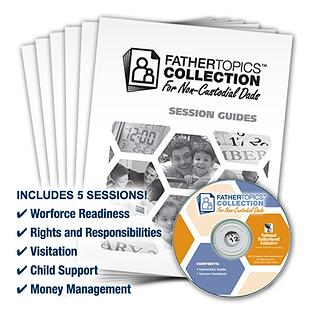
If you have fathers in your program who have a legal obligation to make child support payments, you are not alone. In fact, most fatherhood programs who do work with dads are in this situation.
In this post, we'll cover a number practical things and community partnerships you can establish to help these dads with the issues they face.
Fathers with child support obligations face unique, challenging issues such as: not understanding how the child support system operates; unpaid child support (e.g. large, unpaid arrearages that result from prolonged unemployment or incarceration); legal consequences that result from unpaid child support (e.g. jail time); and missed visitation opportunities when they have visitation rights.
Here are some ideas to consider as you work with these fathers.
- Learn how the child support system in your community and state operates and share that information with fathers. Although a federal program, the operation, services and structure of child support systems vary greatly by state and even by municipality within a state. The dads themselves may not be very knowledgable of the system. Contact the local child support enforcement office (the actual name of the office might be different) and review materials the office might have that will help educate you about the system. Ask staff for other ways that will help you learn.
- Invite an attorney with child support expertise, a judge, or other expert, such as a child support office representative, to address your fatherhood group. Because many fathers have a high level of interest in learning about child support, advertise an event that educates fathers on child support to help you recruit fathers into your fatherhood group.
- Encourage fathers to request visitation and whenever possible to be there emotionally and physically for their child. In many cases, the right of visitation (unless specifically restricted by the court) is not legally connected to the father’s pattern of child support payments. Even if the father is not able to pay child support (or only partially pay), he might still have visitation rights.
- Encourage fathers to make a serious effort to provide at least some child support, even if it isn’t possible to provide the full amount. Appeal to a fathers’ sense that they should pay because, well, they are the father. They have an opportunity to show fatherly care and concern in this way besides being legally obligated to do so.
- Encourage fathers to be involved, responsible, and committed in the lives of their children to as great a degree as possible and to not become distracted by who receives the child support or by the specific way in which the child support is used after they pay it.
- Encourage fathers to acquire competent legal advice regarding child support matters either by hiring an attorney or by securing legal services in some other way. You can recommend ways in which they can go about securing competent advice that is appropriate for dads’ specific situations and municipalities.
- Strongly encourage fathers to go to every court hearing regarding their child support obligation. Court hearings are a time when a father can show the judge that he is doing everything he can to parent his children.
- Investigate whether your state offers a program that forgives some or all child support arrearages and, if it does, assist fathers to meet the criteria. Typically in such cases, a portion of the interest due to the state on unpaid child support, but not the amount of the original child support obligation, can be forgiven if the father meets certain criteria.
As you help fathers learn more about the child support system and how to effectively participate in it, they will be in a better position to connect with their children and more fully understand what it means to be a “24/7 Dad”.

Looking for more ways to help the dads you serve with specific challenges they face?
NFI's FatherTopics™ Collection for Non-Custodial Dads is our most popular resource for working with non-custodial dads that helps them address child support and money management issues.









